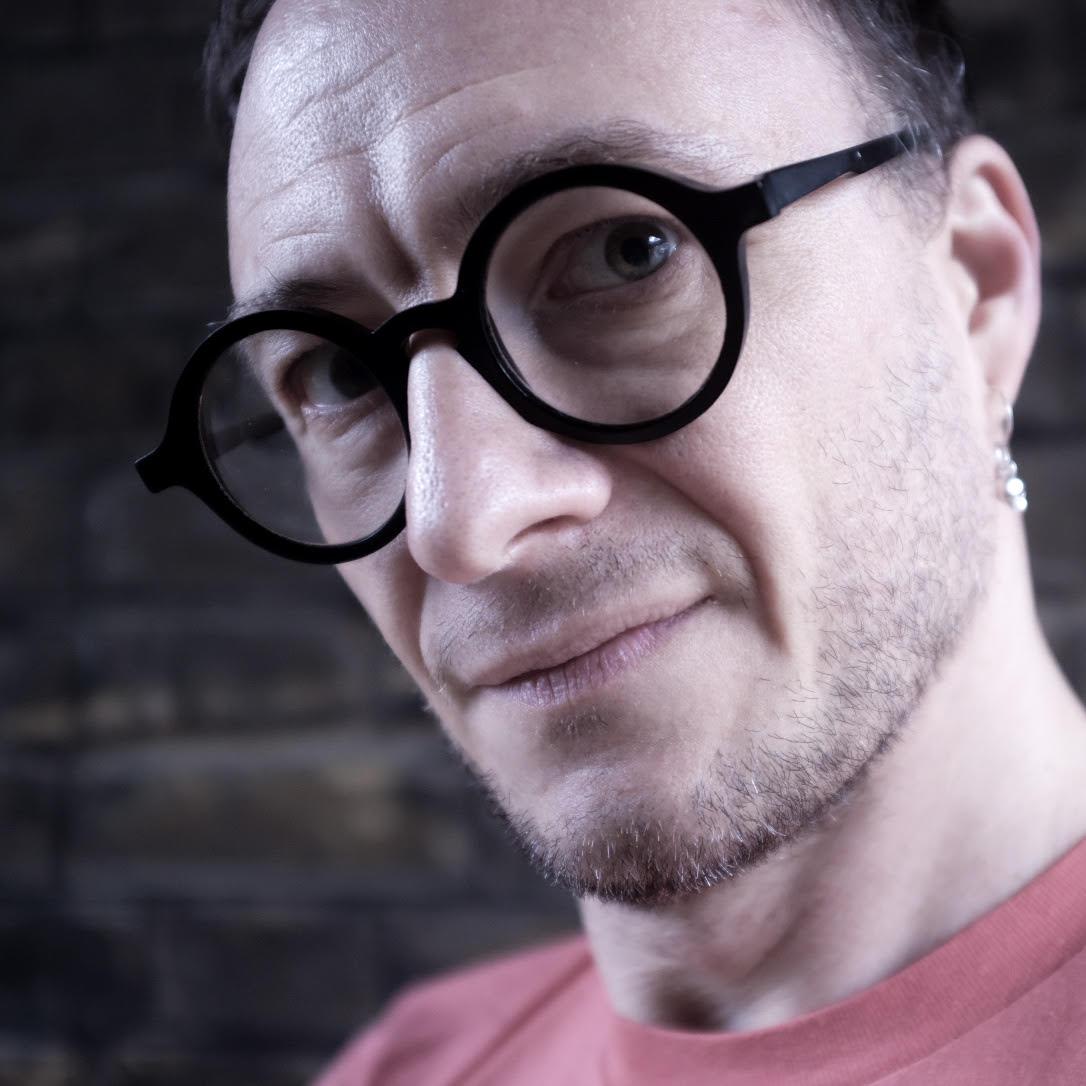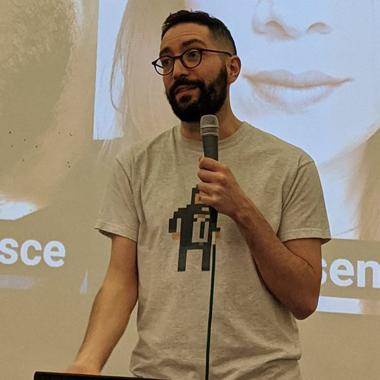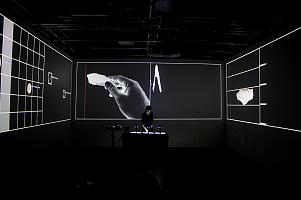MA
Games and Playful Design
Content navigation menu
Why study MA Games and Playful Design at Goldsmiths
On this brave games Masters focusing on game design, you’ll explore the ways that games are used in the creative arts to engage conversation, inspire personal expression, and explore our world.
-
This degree will teach you how to use game design to develop aesthetic awareness, and create meaningful experiences. With technology and gaming becoming part of our everyday lives, the industry has adapted to use games to tell stories, generate knowledge, and educate the public.
-
An explosion of games and apps has created a new breed of entrepreneur, with small teams able to create and launch projects that are accessible to millions. This rising market has become increasingly successful in the UK.
-
Throughout this degree you’ll learn how to build compelling mechanics, craft innovative narratives, and develop immersive playable environments.
- We’ll encourage you to push games into new territories and intellectual domains.
- You’ll explore the freedom of the gaming industry, from putting players in immersive augmented worlds to telling transformational personal narratives, these new experiences are redefining the rules of play.
- You’ll be part of a supportive community of game creators, working on your own or teaming up with fellow students from other games and art programmes.
- You’ll benefit from a vibrant hands-on environment led by lecturers with solid experience in the games industry and other experience design industries.
- You’ll have access to our specialist lab facilities, as well as a large library of video and board games.
- You’ll explore games in a broad way, from industry-oriented development to VR (virtual reality) and AR (augmented reality), building your own alternative controllers, and creating large-scale installations or immersive theatre experiences.
- You’ll be able to participate in regular game jams and industry events on campus.
- We’ll mentor you to help you find your voice and place as a game and experience designer, setting you up with the skills to shape your career, whether as an independent studio owner or elsewhere in the games industry.
Contact the department
If you have specific questions about the degree, contact Fede Fasce or Alan Zucconi.
Length
1 year full-time; 2 years part-time
Entry requirements
You should have an undergraduate degree of at least upper second class standard with an interest in and capability for working in interdisciplinary contexts using technology. In exceptional circumstances, outstanding practitioners or individuals with strong commercial experience may be considered.
Fees
Home - full-time: £12520
Home - part-time: £6260
International - full-time: £18560
Department
Watch videos about your course
What you'll study
All students take the first five modules, and then choose between the last two modules.
| Module title | Credits |
|---|---|
| Approaches to Play 1 | 15 credits |
| Games Anatomy | 15 credits |
| Approaches to Play 2 | 15 credits |
| Interactive Narrative and Digital Storytelling | 15 credits |
| Final Project in Games and Playful Design | 60 credits |
| Visual Game Development | 15 credits |
| or | |
| Games Programming 1 | 15 credits |
Note about optional modules (if available): The above is indicative of the typical modules offered, but is not intended to be construed or relied on as a definitive list of what might be available in any given year. The module content and availability is subject to change.
Teaching and assessment
Taught sessions and lectures provide overviews of themes, which you are encouraged to complement with intensive reading for presentation and discussion at seminars.
Assessments build on lectures and seminars so you are expected to attend all taught sessions to build knowledge and your own understanding of your chosen discipline.
All assessed work is accompanied by some form of feedback to ensure that your work is on the right track. It may come in a variety of forms ranging from written comments on a marked essay to oral and written feedback on developing projects and practice as you attend workshops.
Entry requirements
You should have an undergraduate degree of at least upper second class standard with an interest in and capability for working in interdisciplinary contexts using technology. In exceptional circumstances, outstanding practitioners or individuals with strong commercial experience may be considered.
International qualifications
We accept a wide range of international qualifications. Find out more about the qualifications we accept from around the world.
If English isn’t your first language, you will need an IELTS score (or equivalent English language qualification) of 6.5 with no element lower than 6.0 to study this programme. If you need assistance with your English language, we offer a range of courses that can help prepare you for postgraduate-level study.
How to apply
Apply directly to Goldsmiths using our online application system
Before submitting your application you’ll need to have:
- Details of your academic qualifications
- The email address of your referee who we can request a reference from, or alternatively a copy of your academic reference
- Copies of your educational transcripts or certificates
- A personal statement – this can either be uploaded as a Word Document or PDF, or completed online. Please see our guidance on writing a postgraduate statement
- A portfolio of creative work with at least two examples of past projects. The documentation can vary and be from any discipline. Possible examples include video of a performance, creative writing, a game, design work, drawings, animation, film, music, or documentation of an initiative done within a community.
You'll be able to save your progress at any point and return to your application by logging in using your username/email and password.
When to apply
We accept applications from October for students wanting to start the following September.
We encourage you to complete your application as early as possible, even if you haven't finished your current programme of study. It's very common to be offered a place that is conditional on you achieving a particular qualification.
Late applications will only be considered if there are spaces available.
If you're applying for funding, you may be subject to an earlier application deadline.
Selection process
Admission to many programmes is by interview unless you live outside the UK. Occasionally, we'll make candidates an offer of a place on the basis of their application and qualifications alone.
Find out more about applying.
Fees and funding
Annual tuition fees
These are the PG fees for students starting their programme in the 2024/2025 academic year.
- Home - full-time: £12520
- Home - part-time: £6260
- International - full-time: £18560
If your fees are not listed here, please check our postgraduate fees guidance or contact the Fees Office, who can also advise you about how to pay your fees.
It’s not currently possible for international students to study part-time under a student visa. If you think you might be eligible to study part-time while being on another visa type, please contact our Admissions Team for more information.
If you are looking to pay your fees please see our guide to making a payment.
Funding opportunities
Explore the Goldsmiths scholarships finder to find out what other funding you may be eligible for.
Paying your fees
Find out about paying your tuition fees.
If you are a UK student you may be eligible for a postgraduate loan.
Meanwhile our Careers Service can also offer advice on finding work during your studies.
Additional costs
In addition to your tuition fees, you'll be responsible for any additional costs associated with your course, such as buying stationery and paying for photocopying. You can find out more about what you need to budget for on our study costs page.
There may also be specific additional costs associated with your programme. This can include things like paying for field trips or specialist materials for your assignments. Please check the programme specification for more information.
Student work
The Best Days by Marcus Ansley
"This game is about student life and mental upkeep. It’s about pushing forward through the days and nights while attempting to stay healthy and sane. It’s a game about the invisible hours spent toiling away in a room without company. These are, in short, the best days of your life."
Find out more and play The Best Days on itch.io.
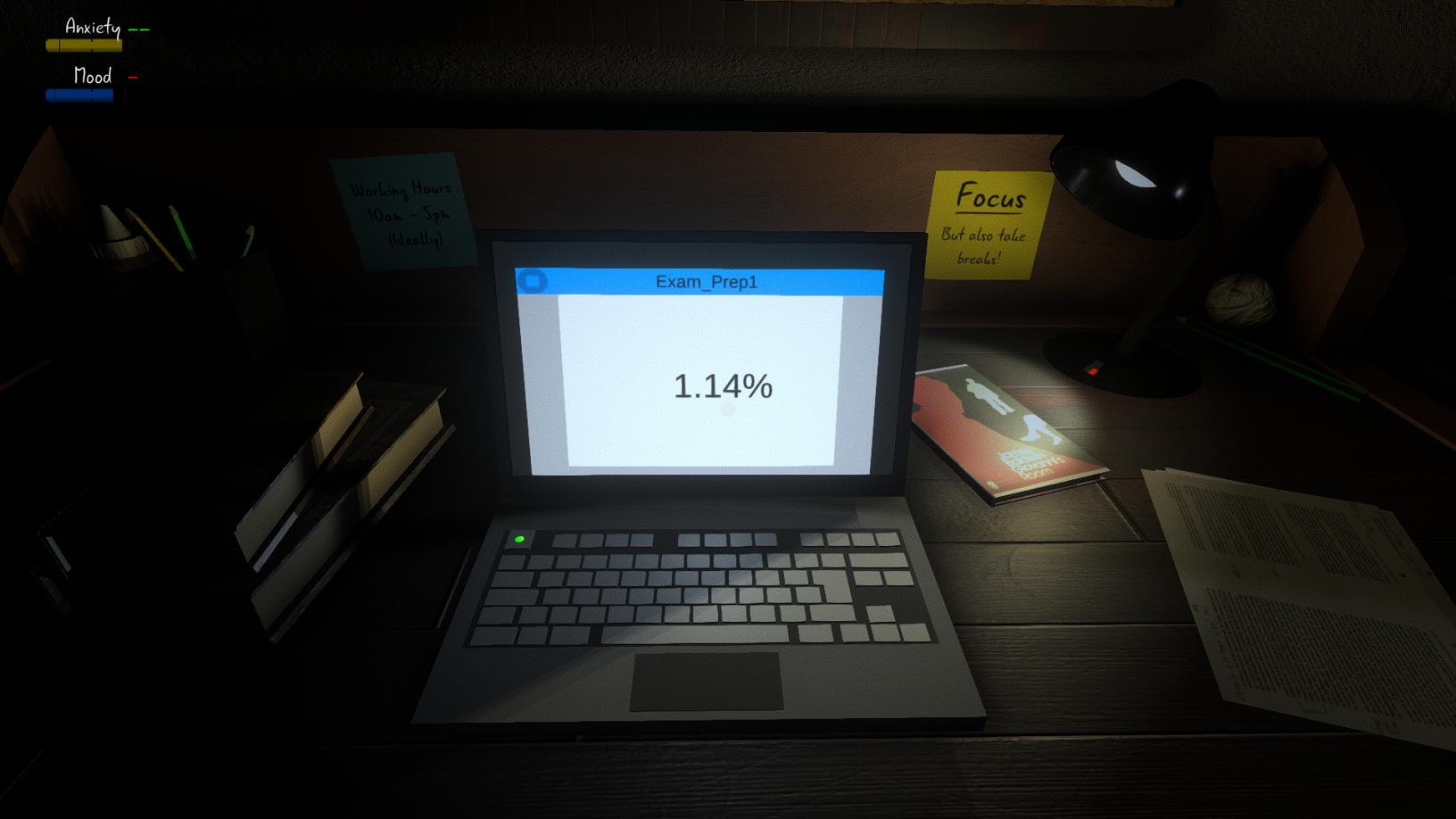
Artisan Bay by Shani Thompson
"For my final project I designed and programmed a digital simulation crafting game, I based my game on the subject of my dissertation which aimed to bring together information and data on how craft and material properties are included in simulation role-playing games. The topic of research was inspired by the lack of academic research into craft and crafting within digital games."
To find out more and play Artisan Bay, visit itch.io.
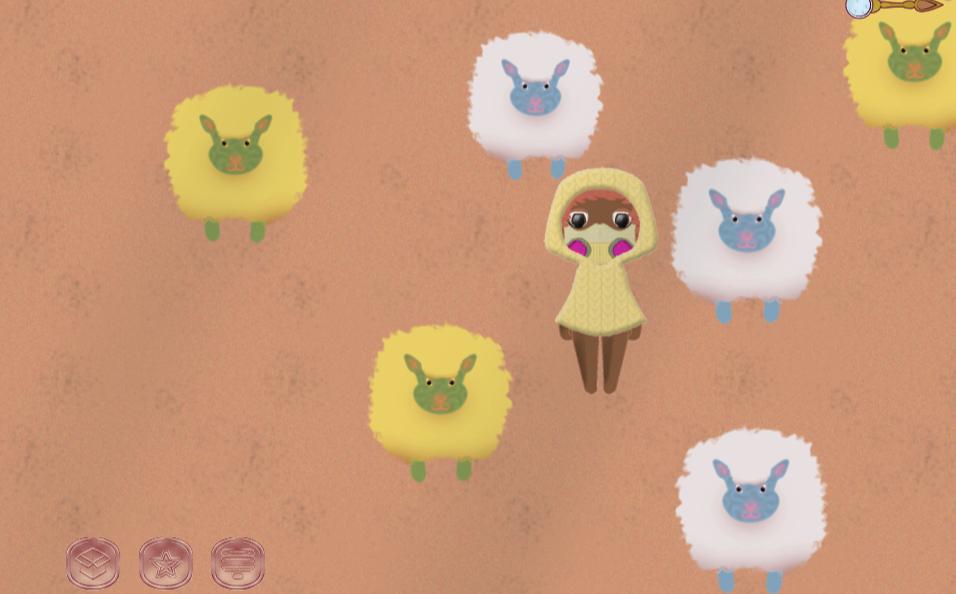
A Party to Murder by Russ Bittles
Russ' final thesis project was centred around the idea of branching narrative and having a game provide new choices to a player based on previous actions. The game, titled 'A Party to Murder', tasked the player with instigating non-player characters to commit murder at a banquet, at the behest of the King, through the use of selectable interactions and narrative choices.
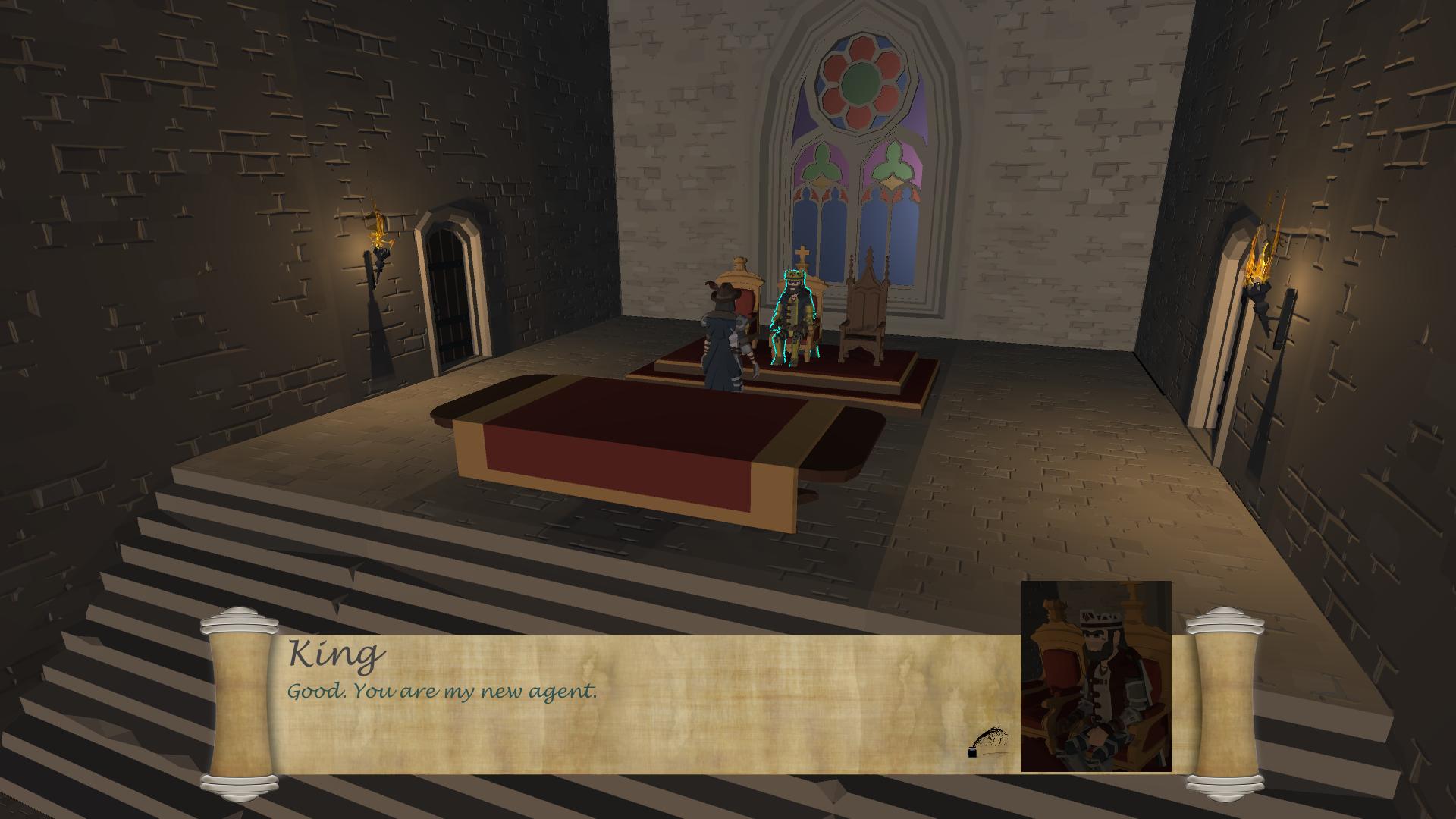
Careers
Where this degree can take you
The degree aims to prepare students to access the game industry, both in the AAA and in the independent sectors, as game designers. It also gives extensive access to companies working in all sorts of interactive entertainment, as a game designer and professional expert in using interactivity for designing immersive experiences.
In addition, the degree allows students to start their own game studio or related activity with a clear and defined path.
In the mid-long term, students who have successfully taken the degree can aspire to become creative directors, both in games and in other interactive experiences.
Students are supported from the start to the finish of this programme in order to understand the different potential career journeys they can follow and to build a portfolio of work to demonstrate their capability to gain employment or freelance work in that area.
You’ll gain a host of transferable skills that are valuable in game design but also in other industries. These include independent games, XR (extended reality) studios, interactive film, advertising and media outlets, journalism, non-profits, education, design, and fine arts.
Industry links
We have a strong network of games companies and studios and have a succeeded in placing a large number of students, the majority of which have gone on to permanent jobs in the organisation. In additional to paid commercial placement, we offer the option of projects that are sponsored and co-supervised by non-profit organisations or other academic departments or institutions.
We already have existing links with many of these independent companies. These include Niantic, Nexus, Six to Start, PlayLab London, Matheson Marcault, Media Molecule, Punchdrunk, Electric Square, Chorus, Frontier, Ubisoft, Payload Studios, Unit 9, Preloaded. We also have links with London and international games events such as Now Play This, Indiecade, Wild Rumpus, A MAZE, Resonate, Creative Coast, Game City, Control. Finally, we have links to media outlets and industry affiliations including Vice, Motherboard, Kill Screen, Polygon, Gamasutra, Rock, Paper Shotgun, Women in Games, Code Liberation Foundation, Geeks for Equality, Gaymer X, Make Magazine, Hackaday, Facets Conference, Unity 3D, UKIE, V&A, Sony, Microsoft, The Guardian, and The BBC. These connections are complimentary to our strong links within large scale games development and will help facilitate employability, promote student work, and empower us to have a national and international presence.
